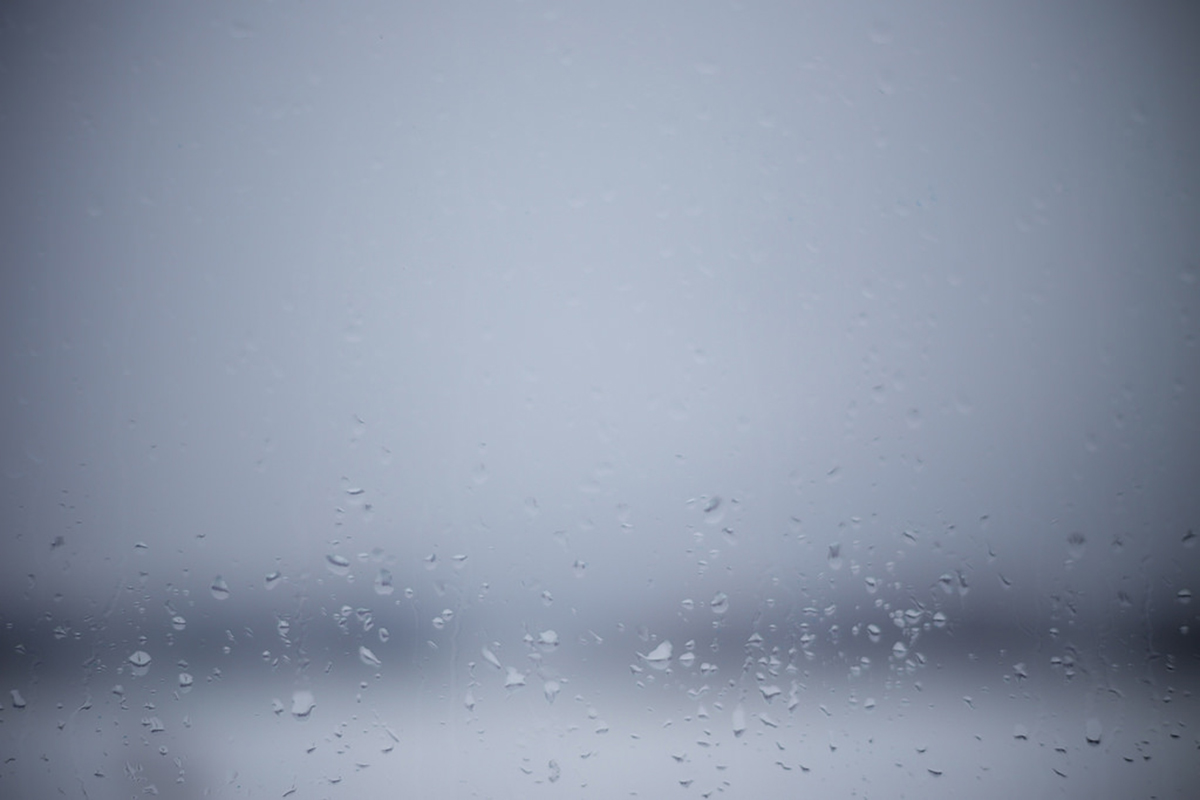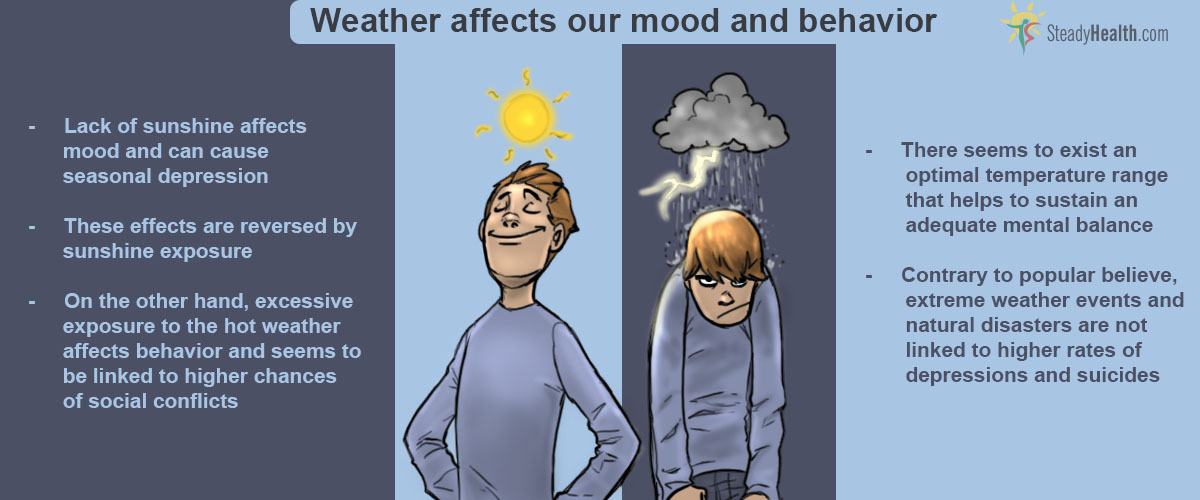Everyone is well aware that extreme temperatures, be they extremely high or extremely low, are harmful for our bodies. What is interesting to note, though, is that this health threats take a hit not only on our general physical well-being, but also on our mental welfare.
This question sparks an additional interest if one considers the possible consequences of such effect given the present dangers of climate change. Global warming is undoubtedly here, and therefore the eventual effects of weather on mood can only be heightened in the years to come.
Winter sadness, or something more serious?
Seasonal affective disorder (SAD), although fairly uncommon, has long been established as an actual psychological problem. Many of us have a genuine dislike for winter - we are less active and we may not have as much fun. This can surely bring us down, but it is nothing when compared with what individuals diagnosed with SAD feel. SAD is a clinically recognized, seasonally recurrent depression, which usually starts during the fall or winter and subsides in the spring. It is characterized by the typical depressive symptoms of long-lasting sadness and hopelessness and other, more atypical symptoms, like longer sleep duration and carbohydrate craving. Cognitive symptoms, such as memory and learning impairment, are also present.
The exact cause of SAD is not fully understood, but it is believed to be related to a combination of factors. The changing seasons and reduced daylight can disrupt the body's internal clock, leading to disturbances in sleep patterns and mood regulation. This disruption in circadian rhythms may play a role in the development of SAD. Also, reduced daylight can lead to increased melatonin production, potentially causing symptoms of fatigue and lethargy.
Several findings about seasonal effects suggest that exposure to sunlight immediately improves mood and cognition and this has been observed not only in people with SAD, but also in people diagnosed with other forms of depression. Placebo-controlled studies documented that artificial sunlight (produced by a very bright lamp) improves mood and diminishes SAD symptoms for a majority of SAD and non-SAD depressed people.
Serotonin is one of key chemicals in our brain, and changes in its level substantially influence not just our brain function but also our general perception of environment and people around us.
Extreme weather can significantly affect our mood
It is not just the seasonal fluctuations in weather that can bring about distress. Extreme meteorological events, like floods, tsunamis and hurricanes can also have public mental health implications in those areas at a higher risk for these phenomena. Obviously there are some people who cope better than others with these difficult situations. Broadly, vulnerability factors are variable and include preexisting factors such as cultural, social, and economic background, natural disaster-related factors, such as type of event, magnitude of event, threat to the life, and extent of loss; and post-disaster factors, such as social support, coping skills, and secondary stressors (e.g., becoming unemployed).
See Also: Say goodbye to winter moodiness!!!
A study, published in 2013, looked at all the existing evidence on the potential impact of natural disasters specifically on suicidal behaviors and the results were rather complex. Comparisons between countries and different sorts of events are difficult, because variability limits the reliability of such comparisons. However, the authors highlight some interesting findings. For example, suicide ratesdropped after the Northridge earthquake in the US for both genders and for males after the Kobe and Niigata-Chetsu earthquakes in Japan.
Weather Can Affect Both Mood And Behavior
On the other hand, while we may be the most happy and laid back when the sun is shining, too much heat can actually… well, make us boil! The possible existence of a link between sprouts of violence and high temperatures has been studied for a number of years now. Last year, researchers from the University of Berkeley (California, USA) published what has been dubbed as a remarkably strong paper by specialists.

For instances, the frequency of inter-group conflicts, like riots or civil wars, rises by 14%! And yes, global warming may even trigger a massive increase in violent behavior because of this association – which leaves us all understandably apprehensive.
Is temperate climate the best for our mood?
So, if meteorological extremes have such a negative impact on people, it should follow that mild weather and temperate climate are precisely what’s best for a good mood and jolly behavior. Studies on this particular question are not particularly abundant. A group of researchers from the University of Munich analyzed a set of 67 countries and attempted to correlate the differences in self-reported levels of happiness with the differences between those countries’ climates.
Research on the effects of weather on our mood is diverse and the conclusions of the above research are equally varied – sometimes even conflicting. Most of us agree that good weather is generally uplifting and energizing. Others, however, hold a personal preference for rainy days and cold mornings. Or, on the opposite side of the spectrum, many people are much happier in the hot climate and never-ending sunshine. Despite natural variations, a solid amount of studies have demonstrated reasonably stable correlations between certain meteorological variables and human functioning and/or behavior.
See Also: Neuromediator Serotonin Is Linked To Major Neurological Disorders, Depression And Suicidal Behaviour
Some people may prefer hot and sunny climates, while others may enjoy colder and more temperate regions. It's also important to consider factors like personal and cultural preferences, family and social connections, and career opportunities when determining the ideal climate for one's mood and lifestyle.
Perhaps by conceiving a study on a larger time scale, with a larger number of participants and better defined criteria for measuring the mood and happiness, the influence of weather on the behavior of individual subjects could be examined more effectively. In the meantime we can all follow our intuition and embark on a holiday in sunshine when the rains back home become too depressing. It seems that our intuitive perception of weather correlates quite well with our psychological and physiological parameters.
- KÕLVES, K., KÕLVE, K. E. & LEO, D. D. 2013. Natural disasters and suicidal behaviours: A systematic literature review. Journal of Affective Disorders, 146, 1-14
- KELLER, M. C., FREDRICKSON, B. L., YBARRA, O., CÔTÉ, S., JOHNSON, K., MIKELS, J., CONWAY, A. & WAGER, T. 2005. A Warm Heart and a Clear Head: The Contingent Effects of Weather on Mood and Cognition. Psychological Science, 16, 724-731.
- Mindmap by steadyhealth.com
- Photo courtesy of Robert S. Donovan by Flickr : www.flickr.com/photos/booleansplit/13168384024
- www.mi.uni-hamburg.de/fileadmin/fnu-files/publication/working-papers/FNU20.pdf
- www.the-scientist.com/?articles.view/articleNo/36822/title/Climate-Change-and-Violence/
- healthland.time.com/2012/10/31/how-disasters-bring-out-our-kindness/
- www.climateinstitute.org.au/articles/publications/a-climate-of-suffering-the-real-costs-of-living-with-inaction-on-climate-change.html
- oregonstate.edu/ua/ncs/archives/2013/aug/winter-depression-not-common-many-think-osu-research-shows



Your thoughts on this